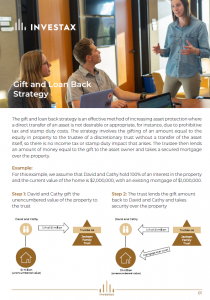How to protect your equity in your house or assets against claims from unsecured creditors
As a business owner your assets including your house could be at risk without proper asset protection. One of the most effective strategies you can put in place to protect your equity (assets) is commonly referred to as a gift and loan back strategy.
This is a tax-effective strategy and in its simplest form involves managing risk by removing the value of your assets, out of your name. Effectively, you remove the asset from a high-risk environment to a low-risk environment. High risk broadly means where you are at a higher risk of being sued or otherwise having your assets subject to creditors.
The benefit of this strategy is that it can occur without transferring the legal ownership of the asset itself.
What kind of assets can be used?
Generally, this type of arrangement will involve real estate and a mortgage will be registered at the Land Titles office. If no real property is available to be used, personal property can be used, and security can be registered with the Personal Property Securities Register (PPSR).
How you can protect your equity: a wholly owned Investment Property?
If you own an investment property outright which has a value of $ 1 million. In this case, the equity in the investment property is 100%. By using a Trust or forming one and ensuring the correct documentation is prepared, the Trust becomes a secured creditor protecting the house against any unsecured creditors, if they pursue you.
The process of setting up a trust will involve the following:
- The property owner creates a trust e.g. ‘The Property Trust No. 1’ – (name of the trust)
- A loan to the value of the equity of the property is lent by the owner to Property Trust No. 1.
- The trust then lends the $ 1 million back to the property owner
- The trust will register security over the property by way of a mortgage
The Advantages of a Gift-Loan Back Strategy
This strategy is often an internal one. There is no requirement for cash, and it is possible to use a negotiable instrument against the available equity in the asset. The additional benefit of this approach is that there is generally no adverse tax or stamp duty implications if the documentation is correctly prepared.
Can it be overturned in bankruptcy or at law?
Bankruptcy or corporate law clawbacks may occur where a gift or ‘under value’ transaction has occurred within five years of the party becoming insolvent. This period is generally reduced to four years if the party can show they were solvent at the time of the transaction. For this reason, a solvency statement will generally be requested from your accountant. However, if the transfer was done purely for the purpose of avoiding creditors, there is no limit on time.
Obtain Professional Advice
The arrangements need to be carefully discussed with both your legal and accountant/financial advisors and need to be constantly reviewed to ensure any changes are accurately captured. Issues to consider when undertaking this approach may relate to changes in bankruptcy clawbacks, the management of the trust to ensure that the Trust that will make the secured loan does not itself conduct any risky business or other activities.
If there is a third-party financier who already has a mortgage or security over the asset, they will generally require a deed of priority securing their lending as a first priority before the Trust’s second mortgage.
To effectively implement this strategy, you must ensure the legal documentation is correct. It will include a deed of gift, loan contract and a mortgage or security document. It may also require consultation with your financier if there is a loan or mortgage over the asset to ensure they consent to the arrangement.
If you would like further advice to find out if this approach is appropriate for you, please contact out office.
Source: John Ioannou | Principal Lawyer – Commercial Tax | Macpherson Kelley

Download our Gift and Loan Strategy Fact Sheet here
General Advice Warning
The material on this page and on this website has been prepared for general information purposes only and not as specific advice to any particular person. Any advice contained on this page and on this website is General Advice and does not take into account any person’s particular investment objectives, financial situation and particular needs.
Before making an investment decision based on this advice you should consider, with or without the assistance of a securities adviser, whether it is appropriate to your particular investment needs, objectives and financial circumstances. In addition, the examples provided on this page and on this website are for illustrative purposes only.
Although every effort has been made to verify the accuracy of the information contained on this page and on this website, Investax, its officers, representatives, employees, and agents disclaim all liability [except for any liability which by law cannot be excluded), for any error, inaccuracy in, or omission from the information contained in this website or any loss or damage suffered by any person directly or indirectly through relying on this information.





